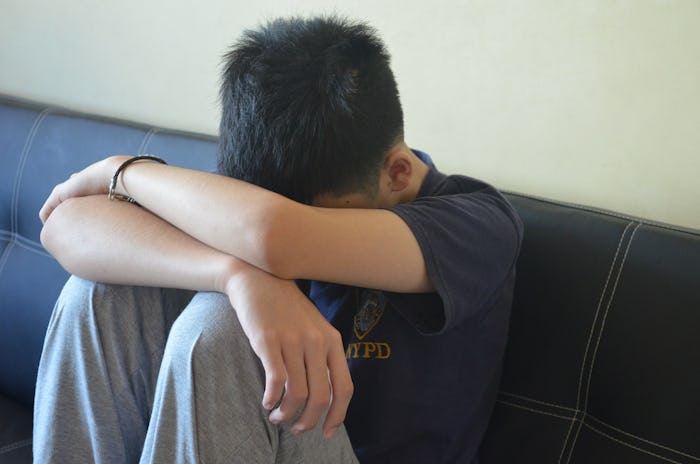Everyone gets sad on occasion, and kids are no exception. But with countless heartbreaking news reports of children and young teens taking their own lives after silent battles with depression, it's more important than ever to recognize the signs your child is depressed and not just sad.
According to Health Central, depression in children and teens can come in two forms; recurrent major depression, which are periods of severe depression, and dysthymia which is a "low level" depression that can last for years. Both forms of depression require a visit to a health professional such as an psychologist or psychiatrist for a diagnosis and treatment. It's tough when you aren't quite sure if your child is experiencing a normal bout of everyday sadness, or is in fact depressed. One good indicator is the length of time your child has been exhibiting symptoms. If it's been two weeks or more, you will want to consider making a doctor's appointment.
Unfortunately, depression is becoming all too common in children. WebMD reported that approximately two percent of young children, and four to eight percent of adolescents, suffer from depression. According to the Anxiety and Depression Association of America (ADAA), in 2014, an estimated 2.8 million adolescents ages 12 to 17 in the United States had at least one major depressive episode.
If you're worried about your child, here are some signs that your child may be suffering from depression. And, as always, if you have an suspicions, it's important to consult a doctor as soon as possible.
1They Suffer A Deep Sadness For More Than 2 Weeks
If your child experiences a deep sadness that lasts for more than two weeks, he or she can be suffering from depression, according to Everyday Health. Talking to your child's friends is a good way to identify if you child is showing symptoms of depression outside of the home.
2They Have Poor Self-Esteem
In the same Everyday Health article, child and adolescent psychiatrist, Tatiana Falcone said children who are depressed often exhibit poor self-esteem. They tend to feel unloved, unlovable, or even worthless.
3You Suffer From Depression
According to the ADAA, children whose parents suffer from depression are at a greater risk for depression themselves. If you or your spouse have suffered from depression, it's importation to watch for those signs in your children.
4They Struggle With Sleep
Changes in sleep patterns, especially insomnia, is a sign of depression according to the National Sleep Foundation. Children who are depressed often have trouble falling asleep or sleep all day and have trouble getting out of bed.
5They Express Suicidal Thoughts
Kids who have thoughts of suicide or death, or show lack of concern about what happens in the future should be immediately taken to a health professional to be evaluated for depression according to Kids Health From Nemours.
6They Don't Enjoy Things That Once Brought Pleasure
A child who is sad usually can be cheered up by participating in an activity that he or she enjoys. Kids Health From Nemours added that depressed children are unable to enjoy the activities that used to bring pleasure.
7They Isolate Themselves From Friends Or Family
It's not uncommon for adolescents to want to spend less time "hanging out" with Mom and Dad. But if your child is isolating him or herself from peers as well as adults, it could be a sign of depression according to the American Academy of Pediatrics.
8They Feel Aches and Pains For No Reason
The American Academy of Pediatrics also warned that children who experience aches and pains for no reason could be depressed. Always talk to a healthcare professional when your child is experiencing pain as it can be due to an underlying medical condition.
9They Change Their Eating Habits
Kids who are tormented by (or because of) their weight, will often make a drastic and unhealthy change in eating habits. These changes in eating habits can be a sign of depression, according to Everyday Health. The American Journal of Epidemiology studied weight and depression in teens, and found that overweight or obese girls were almost twice as likely to have depression as girls who had a healthy body weight.
